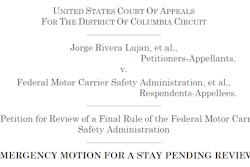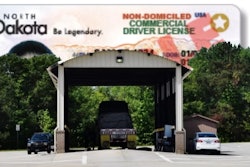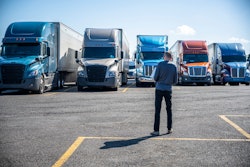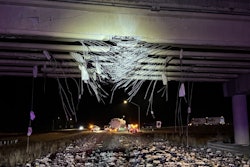Trucking news and briefs for Wednesday, Oct. 29, 2025:
- Congress’ recent focus on commercial credentialing intensifies with call for a CDL-testing probe, more focus on English requirements.
- Autonomous operations expanding in Texas.
- Major OEM looks to improve OTR lifestyle for four-legged passengers.
Lawmakers call for investigation into ‘CDL mills’, introduce bill to require English-only CDL tests
A pair of U.S. Congressmen are calling on Transportation Secretary Sean Duffy to open an investigation into so-called “CDL mills.”
Sen. Tom Cotton (R-Arkansas) and Rep. Andy Barr (R-Kentucky) sent a letter Tuesday, Oct. 28, to Duffy urging the investigation. “CDL mills are substandard training programs that offer quick credentials, and recent incidents and reports indicate these mills are prioritizing volume over proper safety and training requirements,” the letter states.
Cotton and Barr go on to say that these programs “have exploited loopholes in the Federal Motor Carrier Safety Administration's (FMCSA) Entry-Level Driver Training (ELDT) regulations to churn out minimally trained drivers with little regard for real-world proficiency.”
Because these programs focus on passing CDL tests “with little to no hands-on experience,” Cotton and Barr said the result is new CDL holders “ill-equipped to handle the real-world demands of interstate trucking.”
The lawmakers called for the investigation to “rigorously assess whether CDL training programs are upholding ELDT standards, particularly with behind-the-wheel training, pre-trip inspections, and on-road proficiency.”

[Related: FMCSA really cracking the whip on 'bad actor' CDL schools?]
In addition to sending the letter to the DOT Secretary, Cotton and Barr were also among lawmakers to introduce the “Secure Commercial Driver Licensing Act” in their respective chambers of Congress Oct. 16.
The bill, if passed, would require all CDL testing to be conducted in English only and allow the Transportation Secretary to suspend or revoke a state’s authority to issue non-domiciled CDLs if they aren’t compliant with federal standards.
Specifically, the bill would:
- Require all testing related to the issuance or renewal of a CDL, including non-domiciled CDLs, to be conducted only in English. This would apply to any tests administered as part of the ELDT program, any knowledge tests part of the issuance or renewal of a CDL, and any tests administered by third-party training providers. Currently, knowledge tests can be legally administered in other languages.
- Empower the Secretary of Transportation to suspend or revoke a state’s authority to issue non-domiciled CDLs if found non-compliant with federal standards.
- Require individuals to hold a standard driver’s license for one year before obtaining a CDL.
“As the sponsors of the Secure Commercial Driver Licensing Act, we have been at the forefront of efforts to strengthen our commercial licensing system,” Cotton and Barr said to conclude their letter to Duffy. “While Congress works to pass the legislation, we strongly encourage DOT to use its rulemaking authority to make further changes like mandatory training hours behind the wheel for CDLs.”
[Related: At least 30 hours behind the wheel: Driver training committee offers consensus recommendation]
Aurora expands ‘driverless’ operations in Texas
Autonomous truck developer Aurora Innovation on Oct. 28 announced commercial operations on a second “driverless” route from Fort Worth to El Paso. Additionally, the company said it surpassed 100,000 Aurora Driver tech-piloted miles on public roads and is planning to deploy “hundreds of driverless trucks” with the hardware and software in 2026. While the company touts its operations as driverless, a human operator remains in the cab.
“Six months out from launch, we’re achieving more industry-firsts, expanding quickly, and paving the way to deploy hundreds of trucks next year,” said Chris Urmson, co-founder and CEO at Aurora. “Expanding to El Paso, notching over 100,000 driverless miles, and integrating our new hardware with multiple truck platforms extends our strong lead.”
[Related: Could 'driverless' tech be coming for trucking sooner than we think?]
The route was chosen, Aurora noted, because “staffing challenges and the difficulty of completing the 10-hour haul in a single day make the route daunting for carriers.” Customers on the El Paso route include Hirschbach Motor Lines, an early adopter of the Aurora Driver technology, Russell Transport and others.
“As an early adopter, we embrace the opportunity to help define the future of freight technology,” said Richard Stocking, President & CEO of Hirschbach Motor Lines. “Integrating an additional fleet strengthens our driverless capacity -- a vital advancement in ensuring we meet customer demand and deliver operational excellence.”
[Related: Aurora says it's hauling driverless for Uber Freight, Hirschbach between Dallas and Houston]
Aurora also unveiled next-generation Driver hardware designed to reduce overall cost by half while boosting performance and durability. Features:
- Expected life cycle more than a million miles
- New FirstLight Lidar updates detect objects 1,000 meters away -- twice the distance of the current generation
- Enhanced sensor cleaning will help the Aurora Driver in harsher weather conditions
The new hardware is manufactured by Fabrinet and precedes the highly-scalable hardware being jointly developed with AUMOVIO (formerly Continental), which is slated for production in 2027 and is expected to enable the deployment of tens of thousands of trucks.
The new hardware is being integrated with the Volvo VNL Autonomous, where lineside integration is taking place at Volvo’s New River Valley manufacturing facility, and a new fleet of International LT Series Class 8 vehicles at Aurora’s Pittsburgh hardware facilities. Paccar continues to test its autonomy-enabled truck platform at its facilities.
[Related: Will owner-operators have to compete with 'driverless' fleets?]
Volvo partnership to enhance pet safety, comfort OTR
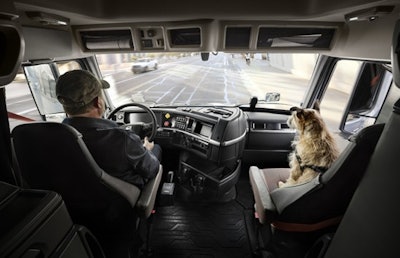 Volvo Trucks is partnering with the Center for Pet Safety in hopes of developed digital resources to enhance travel safety for pets in commercial trucks.Volvo Trucks
Volvo Trucks is partnering with the Center for Pet Safety in hopes of developed digital resources to enhance travel safety for pets in commercial trucks.Volvo Trucks
Volvo Trucks North America is partnering with the Center for Pet Safety to promote safer, more comfortable travel for commercial truck drivers and their four-legged companions.
For many professional drivers, traveling with a pet is part of the lifestyle offering comfort, companionship, and a sense of home on every route. This new collaboration aims to help drivers make informed choices to keep their pets safe and relaxed while on the road.
“For many long-haul drivers, their dog is their constant companion through every mile,” said Maddie Sullivan, product marketing manager, Volvo Trucks North America. “Safety is in our DNA, and that extends to everyone on the road whether they have two legs or four. We’re proud to partner with the Center for Pet Safety to better understand how drivers travel with their pets and to share practical guidance that supports their comfort and safety.”
As part of the collaboration, experts from the Center for Pet Safety will visit the Volvo Customer Center in Dublin, Virginia, to review Volvo Trucks’ new long-haul flagship VNL. Pet safety specialists will experience the VNL’s comfort and safety features, and interior layouts, firsthand. A major focus will be on the Volvo Parking Cooler and other systems that maintain optimal in-cab conditions for both drivers and pets.
That’s crucial for drivers who travel with animals and may need to leave them in the cab during short breaks under any weather conditions, Volvo said. Through Volvo’s connected app, drivers can remotely monitor and adjust cab temperature, ensuring a safe, comfortable environment that helps pets stay calm and alert.
[Related: The new Volvo VNL, inside and out: Take the tour with Volvo's Chris Stadler]
“We’re excited to collaborate with Volvo Trucks North America to spotlight the unique needs of commercial drivers traveling with their pets,” said Lindsey Wolko, founder and chief executive officer of the Center for Pet Safety. “This partnership will deliver practical guidance, product recommendations, and travel resources tailored for the long-haul driving community.”
As part of the initiative, Volvo and the Center for Pet Safety will co-develop a digital resource about traveling safely with pets in a commercial vehicle, set to launch on both organizations’ websites in early 2026. The guide will offer practical tips for drivers traveling with pets from in-cab setup and restraint systems to health and wellness planning and lists of safe rest areas nationwide.
